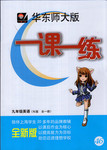题目内容
So desperate ______ that no one could help another, each ____ to save himself and his animals.
|
A.was the situation; was trying |
B.the situation was; trying |
|
C.the situation was; was trying |
D.was the situation; trying |
D
【解析】
试题分析:考查倒装句和独立主格结构。当“so+形容词/副词”放在句首的时候,后面的句子使用部分倒装的形式。排除BC。因为两部分之间没有连词连接,说明第二部分不能是句子,故使用独立主格结构。句意:现在的情况是如此的让人绝望,以至于没有人能够帮助别人,每个人都努力自救和救自己的动物。故D正确。
考点:考查倒装句和独立主格结构。
点评:。当“so+形容词/副词”放在句首的时候,后面的句子使用部分倒装的形式。因为两部分之间没有连词连接,说明第二部分不能是句子,故使用独立主格结构。

 华东师大版一课一练系列答案
华东师大版一课一练系列答案So desperate ______ that no one could help another, each ____ to save himself and his animals.
| A.was the situation; was trying | B.the situation was; trying |
| C.the situation was; was trying | D.was the situation; trying |
I agree with the saying that some people “see old memories as a chance to deal with the past and unite past and present.” Many people are so ___1___ by things that happened in their past that they are not able to focus on the ___2___ . For example, in the book Ceremony, the main character, Tayo, cannot concentrate on the present because he can’t forget his troubled childhood and ___3___ continues to relive things that happened during that time.
However, past memories can help people to ___4___ in the present. A ___5___ example of people learning from the past would be the Marshall Plan. After the ___6___ of World War II there were many war-torn countries around the world in need of ___7___ assistance to help rebuild their countries, and the United States would have to be the one to ___8___ that assistance. Many American politicians thought it was ___9___ for the US government to spend money abroad on countries that would not be able to repay it for a long time. However, George Marshall, a former US general, remembered how the exact same ___10___ of "why should we spend money on war-torn nations that really owe us reparations (赔款)?" had been used after World War I towards Germany. The ___11___ of assistance towards Germany after World War I had caused a gigantic economic depression in Germany that had made the Mark (German money) virtually ___12___ . The German people became so desperate that they started ___13___ an extreme German nationalist named Adolf Hitler, who eventually started World War II. Marshall knew that if the US did not ___14___ war-torn Germany and, especially, Japan, we could ___15___ have a World War III on our hands.
| 【小题1】 |
|
| 【小题2】 |
|
| 【小题3】 |
|
| 【小题4】 |
|
| 【小题5】 |
|
| 【小题6】 |
|
| 【小题7】 |
|
| 【小题8】 |
|
| 【小题9】 |
|
| 【小题10】 |
|
| 【小题11】 |
|
| 【小题12】 |
|
| 【小题13】 |
|
| 【小题14】 |
|
| 【小题15】 |
|